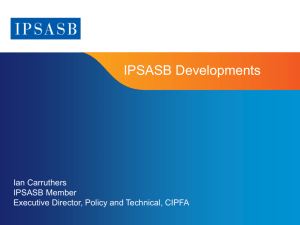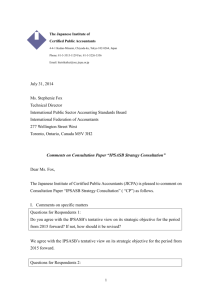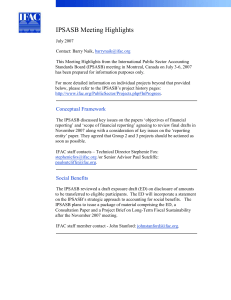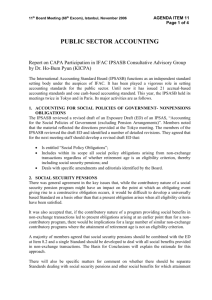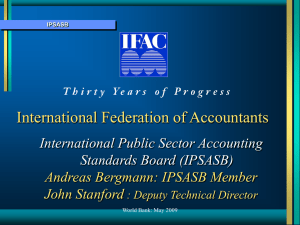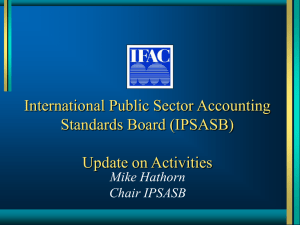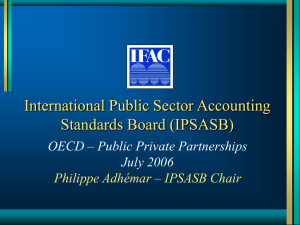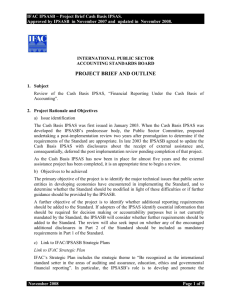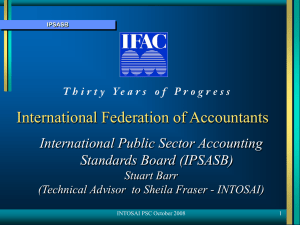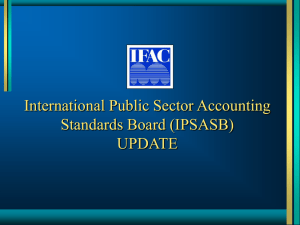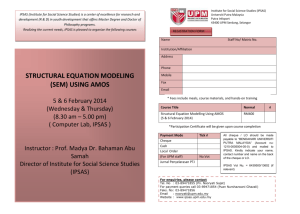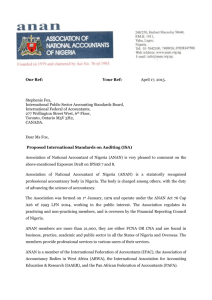Summary of IFAC Education Committee meeting held in Brasilia,
advertisement
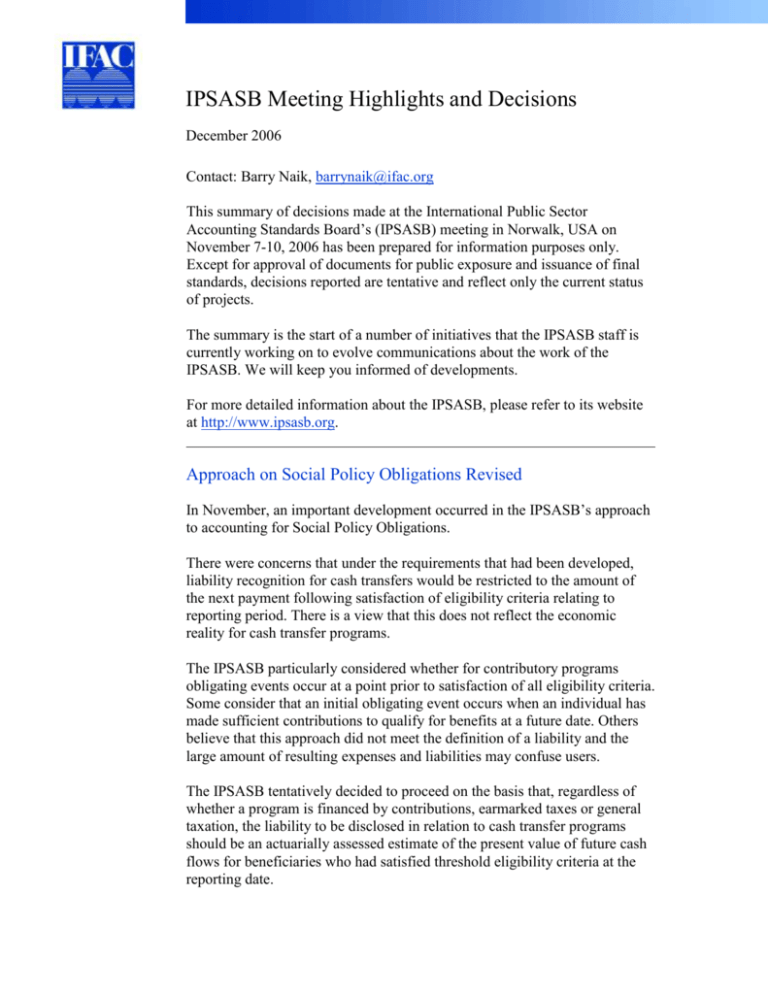
IPSASB Meeting Highlights and Decisions December 2006 Contact: Barry Naik, barrynaik@ifac.org This summary of decisions made at the International Public Sector Accounting Standards Board’s (IPSASB) meeting in Norwalk, USA on November 7-10, 2006 has been prepared for information purposes only. Except for approval of documents for public exposure and issuance of final standards, decisions reported are tentative and reflect only the current status of projects. The summary is the start of a number of initiatives that the IPSASB staff is currently working on to evolve communications about the work of the IPSASB. We will keep you informed of developments. For more detailed information about the IPSASB, please refer to its website at http://www.ipsasb.org. Approach on Social Policy Obligations Revised In November, an important development occurred in the IPSASB’s approach to accounting for Social Policy Obligations. There were concerns that under the requirements that had been developed, liability recognition for cash transfers would be restricted to the amount of the next payment following satisfaction of eligibility criteria relating to reporting period. There is a view that this does not reflect the economic reality for cash transfer programs. The IPSASB particularly considered whether for contributory programs obligating events occur at a point prior to satisfaction of all eligibility criteria. Some consider that an initial obligating event occurs when an individual has made sufficient contributions to qualify for benefits at a future date. Others believe that this approach did not meet the definition of a liability and the large amount of resulting expenses and liabilities may confuse users. The IPSASB tentatively decided to proceed on the basis that, regardless of whether a program is financed by contributions, earmarked taxes or general taxation, the liability to be disclosed in relation to cash transfer programs should be an actuarially assessed estimate of the present value of future cash flows for beneficiaries who had satisfied threshold eligibility criteria at the reporting date. For many public sector entities, recognition based on this criterion would represent a major change in accounting policy. Therefore, instead of addressing recognition and measurement, the IPSASB tentatively agreed to revise the exposure draft (ED) to deal with presentation and disclosure. Disclosure of liabilities will initially apply to major cash transfer programs. Later, this might be extended to all cash transfer programs and, possibly, to certain programs providing individual goods and services. It might also provide the basis for recognizing expenses and liabilities relating to social benefits in the financial statements. The project has now been renamed “Social Benefits,” harmonizing it with existing IPSASB literature. Due to the complex issues in this area, the ED will include an “Introduction to the Issues” section which will highlight that the ED is at a very early stage in the development of an approach. In addition, the Introduction will identify: Issues where there are robust and often conflicting views; and Issues which the IPSASB has had difficulty reaching firm conclusions. Please contact IFAC staff member John Stanford at johnstanford@ifac.org for more information on this project. IPSAS 23, Revenue from Non-Exchange Transactions (Taxes and Transfers), Approved In November, the IPSASB approved International Public Sector Accounting Standard (IPSAS) 23, Revenue from Non-Exchange Transactions (Taxes and Transfers), which establishes requirements for the recognition, measurement and disclosure of a variety of public sector revenues, not previously included in the IPSASs. In approving IPSAS 23, most attention was given to the following issues noting that these and other issues had already been thoroughly considered at either the Invitation to Comment stage or by the Steering Committee responsible for developing the IPSAS: Recognition of a liability with respect to an asset subject to a condition; Permitting, but not requiring, recognition of services in-kind; The distinction between exchange and non-exchange transactions; and The transitional provisions. In considering these issues the IPSASB concluded that it should retain the principles that were proposed in ED 29, Revenue from Non-Exchange Transactions (Including Taxes and Transfers), except that the transitional provisions would be extended to all revenue. However, only a three-year transitional provision would be allowed for non-tax revenue from nonexchange transactions. The new standard is scheduled to be available on the IPSASB website in late 2006 and will subsequently be included in the 2007 Handbook of International Public Sector Accounting Pronouncements. Please contact IFAC staff member Matthew Bohun at matthewbohun@ifac.org for more information on this project. Project Brief on Service Concession Arrangements Reviewed In July 2006, the IPSASB agreed to lead a collaborative project on service concession arrangements, with participation from a group of national standards setters and other organizations (NSS). At its meeting in November, the IPSASB agreed to both the project brief and proposals for the membership of a subcommittee comprising IPSASB and NSS members to develop project material. The subcommittee will initially develop a consultative paper which will take into consideration the principles in International Financial Reporting Interpretations Committee (IFRIC) 12, Service Concession Arrangements. Please contact IFAC staff member Barry Naik at barrynaik@ifac.org for more information on this project. Project Brief on Public Sector Conceptual Framework Reviewed In July 2006, the IPSASB agreed to lead a collaborative project on the development of a public sector conceptual framework, with active participation from a group of NSSs and other organizations. In November, the IPSASB agreed to the project brief, subject to final review and comment by the NSS participants. The IPSASB also agreed on proposals for the membership of a subcommittee comprising IPSASB and NSS members to coordinate and contribute to the development of consultative papers for review by the IPSASB. The IPSASB noted that the project brief may get fine-tuned in the light of progress, experience and input from constituents, but that the project should start now. The final project brief is scheduled to be posted on the IFAC website in late 2006. Please contact IFAC staff member Paul Sutcliffe at paulsutcliffe@ifac.org for more information on this project. IPSAS 24, Presentation of Budget Information in Financial Statements, Approved In November, the IPSASB approved IPSAS 24, Presentation of Budget Information in Financial Statements, which applies to the financial statements of public sector entities which adopt the accrual basis of accounting. It also approved an additional section dealing with the presentation of budget information to be included in the Cash Basis IPSAS, Financial Reporting under the Cash Basis of Accounting (which applies to public sector entities which adopt the cash basis of accounting for their financial statements). Both approved items establish requirements and encouragements for reporting information about the entity’s compliance with budgets which are made publicly available. They are both scheduled to be available on the IPSASB website in late 2006 or early 2007 and will subsequently be included in the 2007 Handbook of International Public Sector Accounting Pronouncements. Please contact IFAC staff member Paul Sutcliffe at paulsutcliffe@ifac.org for more information on this project. Diverse Views – Submissions on Heritage Assets In November 2006, the IPSASB considered submissions received on its consultation paper, Accounting for Heritage Assets under the Accrual Basis of Accounting, which included a discussion paper developed by the United Kingdom Accounting Standards Board (UK ASB). Submissions reflected a range of views on many topics including those summarized below: Recognition and measurement: there were strong views that requirements for recognition and measurement should not depart from those in IPSAS 17, Property, Plant and Equipment. An alternative view was for non-recognition of existing heritage items and expensing new acquisitions; Definition: strong support for the view that heritage items do meet the general asset definition in the IPSASB literature and considerable support for many aspects of the definition of a heritage asset proposed in the UK ASB discussion paper; Measurement bases: a view that, if heritage assets are to be recognized and measured, both cost and valuation models should be permitted; Depreciation/Impairment: a minority supported specifically exempting heritage assets from depreciation and impairment; and Disclosures: considerable support for additional disclosures regardless of recognition, though some concern about the cost/benefit of a large volume of disclosures for entities not having a significant heritage objective. Please contact IFAC staff member John Stanford at johnstanford@ifac.org for more information on this project. General Improvements Project Completed In July 2006, the IPSASB approved three (of 11) improved IPSASs and a revised preface to the International Public Sector Accounting Standards. At the November meeting, the IPSASB approved the remaining eight improved IPSASs, concluding its general improvements project. The eight approved IPSASs are: IPSAS 6, Consolidated and Separate Financial Statements; IPSAS 7, Investments in Associates; IPSAS 8, Interest in Joint Ventures; IPSAS 12, Inventories; IPSAS 13, Leases; IPSAS 14, Events after the Reporting Date; IPSAS 16, Investment Property; and IPSAS 17, Property Plant and Equipment. There were no significant amendments to the requirements in the eight approved standards resulting from the improvements. All 11 improved IPSASs have an effective date of January 1, 2008 and are scheduled to be available on the IPSASB website in late 2006 or early 2007. They will also be included in the 2007 Handbook of International Public Sector Accounting Pronouncements. Please contact IFAC staff member Matthew Bohun at matthewbohun@ifac.org for more information on this project. Next Meeting The next IPSASB meeting will be held in Accra, Ghana on March 20-23, 2007.
